Your cart is currently empty!

If you’ve ever had food poisoning, you’d probably do anything to never have to experience it again!
Unfortunately, you never know when a contaminated piece of food might end up on your plate. Having Chinese medicine for food poisoning on hand is the best way to prevent severe symptoms and reduce the likelihood that you’ll end up in the hospital.
Read on to find out why Chinese medicine for food poisoning formulas are first-aid kit essentials!
What Causes Food Poisoning?
Food poisoning is a gastrointestinal illness that happens when you eat contaminated food. It is a relatively common issue, with over 48 million cases of food poisoning in the US every year, with about 128,000 people needing hospitalization to fully recover.
Food Poisoning Symptoms
- Abdominal pain
- Vomiting and diarrhea
- Cramping
- Fever
- Dizziness
- Lack of energy
- Weakness
- Loss of appetite
- Aching muscles
- Chills
- Sweating
Causes of Food Poisoning
Food poisoning isn’t just caused by undercooked clams or tainted salad bars. There are several reasons why food poisoning occurs. Most cases are due to bacteria like salmonella or Escherichia coli (E. coli) lingering on the food. It can also be caused by viruses like Hepatitis A or norovirus.
So, how does food get contaminated?
- not cooking food thoroughly (particularly meat)
- not correctly storing food that needs to be chilled
- leaving cooked food out too long at warm temperatures
- not sufficiently reheating previously cooked food
- someone who is ill or who has dirty hands touching the food
- eating food that has expired
- bacteria spreading from contaminated foods (cross-contamination)
Nearly any food is susceptible to food poisoning. But, some foods are more likely to harbor germs, such as raw meat and poultry, raw eggs, raw shellfish, raw fruits and vegetables, unpasteurized milk, and “ready-to-eat” foods like deli meats and cheeses.
Food Poisoning and Treatment
Curious about what to do for food poisoning if it happens to you? Many people recover from illness without specifically treating food poisoning. Time and allowing the body to do its job is the “cure” for food poisoning in adults.
In some cases (like pregnant women, the elderly, or those with a weak immune system), extra care is needed. In these cases, hospitalization may be necessary to fully remove the harmful substance and replenish the body’s fluids and prevent dehydration.
Chinese Medicine and Food Poisoning
In Chinese medicine, food poisoning is seen as disharmony in the digestive tract, caused by an external “evil” or pathogen. As this food-born toxin invades the digestive tract, it stops digestion and the food in the Stomach stagnates.
The Stomach qi should move downwards, helping digested food move further into the digestive tract. However, when this stagnation occurs, the Stomach flow is obstructed and it rebels upwards as acid regurgitation or vomiting. Stagnation in the abdomen also causes blocked qi, which is why your abdomen can feel tight or tender to the touch.
In Chinese medicine, food poisoning causes two main patterns to develop:
- Dampness
Dampness is the heavy, nauseating, sickly feeling we get in the stomach. It is usually caused by the tainted food we ate but can be exacerbated by our constitution if we are weak or prone to dampness.
- Heat
Heat, or inflammation, occurs in the digestive tract as an immune response to the harmful food. This heat is what causes the urgency we feel when we need to rush to the restroom.
When we get sick (usually with vomiting and/or diarrhea), the body is trying to rid itself of the harmful substance, as well as the dampness and heat that resulted.
Chinese Medicine Treatments for Food Poisoning
Food poisoning usually resolves on its own in a few hours. But for some people, the effects can last days. To help, TCM practitioners may use acupuncture to move toxins out of the digestive tract and encourage Stomach qi to move downwards again. Acupuncture also helps relieve bloating, fullness, and pain in the abdomen.
Herbal medicine is also very helpful in treating food poisoning. Food poisoning herbs can neutralize the toxins in the digestive tract, expel the harmful substances as waste, and restore the body’s energy and harmony after the issue is resolved.
Herbal Remedies for Food Poisoning
Having at-home herbal remedies for food poisoning can turn an agonizing case of food poisoning into a mild annoyance. These are some of the most popular herbal remedies for food poisoning.
- Activated charcoal
This remedy helps neutralize and eliminate the pathogenic food.
- Kelp
Kelp is packed with minerals and salt. This helps you replenish the electrolytes you’ve lost after vomiting or having diarrhea.
- Probiotics
After a bout of food poisoning, the gut microbiome is damaged. You can revitalize the healthy gut flora in your digestive tract by taking a probiotic (especially acidophilous) and eating prebiotic foods like bananas and mushrooms.
Traditional Chinese Medicine for Food Poisoning
While the herbal remedies above are focused on restoring your body’s health after food poisoning, Chinese herbal medicine for food poisoning can be taken at the time of illness to reduce the severity of your symptoms and help you feel better faster.
Here are our top Chinese medicine for food poisoning formulas to have on hand for when an emergency strikes!
(Note: if you are pregnant or breastfeeding, speak to a licensed herbalist before taking any of these herbal supplements)
-
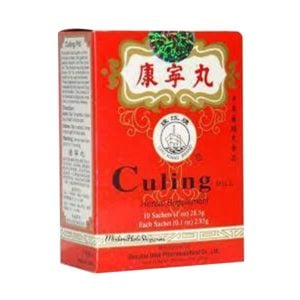 Culing Wan (Kang Ning Wan or Curing Pills) – Chu Kiang Brand
Starting at $12.49
Add to CartSelect options
This product has multiple variants. The options may be chosen on the product page
Culing Wan (Kang Ning Wan or Curing Pills) – Chu Kiang Brand
Starting at $12.49
Add to CartSelect options
This product has multiple variants. The options may be chosen on the product page
Culing pills, or curing pills, are a go-go food poisoning remedy. Keep them on hand whenever you travel or in your home medicine cabinet and take them as soon as you start to feel ill. You can also use these to recover faster from hangovers or overeating.
Po Chai Pills make it easier for your body to clear out toxic foods, dampness, and inflammation. Like Curing Pills, they are meant to be taken short-term for acute bouts of vomiting and diarrhea.
Huo Xiang Zheng Qi San is a classic formula that is used for acute-onset gastrointestinal disorders, like food poisoning. It helps reduce nausea, vomiting, fever, headache, diarrhea, bloating, and abdominal distention. Along with food poisoning, this formula can be helpful for morning sickness or overeating.
Chinese Herbal Teas for Food Poisoning Recovery
After food poisoning has passed and you are in recovery mode, drinking Chinese herbal tea can bring balance and comfort to your digestive tract.
-
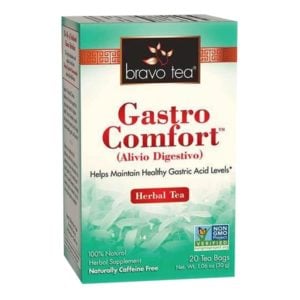 Gastro Comfort Tea – by Bravo Tea
Starting at $6.99
Add to CartSelect options
This product has multiple variants. The options may be chosen on the product page
Gastro Comfort Tea – by Bravo Tea
Starting at $6.99
Add to CartSelect options
This product has multiple variants. The options may be chosen on the product page
If you still experience acid reflux, bloating, or a tender stomach after vomiting has passed, this tea can help. It soothes the stomach and promotes gentle harmony in the GI tract.
This tea helps remove excess waste from the digestive tract and has anti-inflammatory properties. Drink this tea if your food poisoning symptoms last longer than a few days to help rid the body of any lingering toxins. This tea is also helpful if dehydration and unruly Stomach qi have left you constipated.
Fight Food Poisoning Fast with Chinese Herbal Medicine
The best way to avoid food poisoning is to be diligent with washing, cooking, and storing your food. But no matter how careful you are, germs are part of life. There’s no guaranteed way to avoid food poisoning even in the best of circumstances.
So, be prepared! Keep Chinese medicine for food poisoning within reach in case you or your family does succumb to a tainted meal.
Shop our herbal remedies for food poisoning and other gastrointestinal disorders now!
Share This
Table of Contents
- Chinese Medicine and Food Poisoning
- Chinese Medicine Treatments for Food Poisoning
- Fight Food Poisoning Fast with Chinese Herbal Medicine
About the Author
Blog Categories
- Adaptogen Articles (8)
- Brain Health Articles (9)
- Chinese Medicine Basics Articles (13)
- Chinese Medicine for Pain Articles (15)
- Chinese Medicine for Pets Articles (3)
- Chinese Medicine for Skin Conditions Articles (6)
- Chinese Medicine Formula Articles (6)
- Chinese Medicine Sleep Articles (4)
- Conditions & Concerns Articles (24)
- Digestive Issues (5)
- Eating for the Seasons (2)
- Health & Lifestyle Articles (17)
- Heart Health Articles (4)
- In the News (1)
- Medicinal Mushrooms Articles (7)
- Men's Health Articles (8)
- Scholarships (5)
- Uncategorized Articles (9)
- Weight Loss, Diet & Obesity Articles (5)
- Women's Health Articles (10)
Articles Related To Chinese Herbs for Food Poisoning
-
Do tummy troubles keep you from living your life to the fullest? If so, you’re not alone. Gut health conditions like indigestion, heartburn, or constipation affect all of us at some point in our lives. Thankfully, Chinese herbs for gut health offer a natural way to improve your gut health from the root and enjoy…
-
Feeling “sick to your stomach” once in a while might be just a part of life – but that doesn’t mean we have to suffer through it! Nausea, or an upset stomach, is one of the most common digestive issues with a range of potential causes including motion sickness, acid reflux, pregnancy, indigestion, or as…
-
Don’t get stuck in a rut with your digestion. Regular bowel movements are a crucial part of whole-body health, yet many of us ignore our bowel patterns or fail to recognize when things get out of whack. The truth is, our bowel movements say a lot about our internal health. The size, shape, consistency, frequency, and ease…
-
What’s with the gut? These days, it seems like everyone is talking about gut health and how important it is for total wellbeing. Ongoing research has shown that the gut is not just about digestion – it’s the essential factor to create overall health and wellness for the whole body. Without a healthy gut system,…


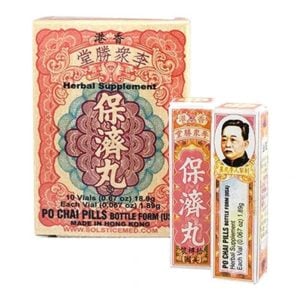 Po Chai Pills (Bao Ji Wan)
Po Chai Pills (Bao Ji Wan)
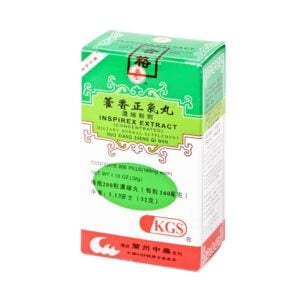 Huo Xiang Zheng Qi Wan – Inspirex Extract – Kingsway (KGS) Brand
Huo Xiang Zheng Qi Wan – Inspirex Extract – Kingsway (KGS) Brand
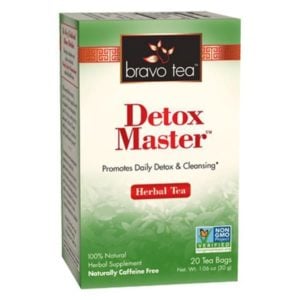 Triple Detox – by Bravo Tea
Triple Detox – by Bravo Tea